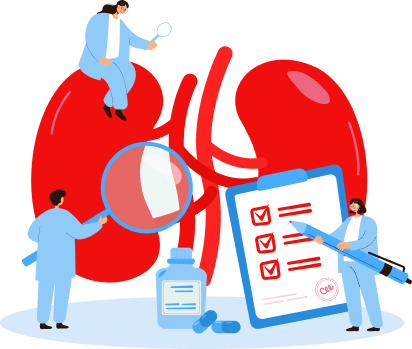Complete Urine Routine Analysis (CUE)
Introduction
Complete Urine Examination (CUE) is a fundamental diagnostic test that offers valuable insights into an individual’s overall health. This comprehensive analysis provides healthcare professionals with essential information about various bodily functions and potential health concerns. In this blog, we will dive into the significance of CUE, why people undergo this examination, who should consider it, associated risks, and the specific tests it covers.
What Is A Complete Urine Examination (CUE)?
Complete Urine Examination, commonly referred to as CUE, involves the thorough analysis of urine samples to evaluate different aspects of health. It assesses various parameters such as colour, clarity, pH levels, specific gravity, presence of proteins, glucose, ketones, blood cells, bacteria, and other substances. This comprehensive assessment helps in identifying abnormalities and potential health issues within the body.
CUE Test Price in Vijayapura - Compare Prices at 1 Labs
Name
Proc. Time
Rating
Price
What Is Included In A CUE?
By combining these two steps, the CUE provides a thorough assessment of urinary health, allowing healthcare professionals to diagnose urinary tract infections, kidney disorders, metabolic abnormalities, and other medical conditions accurately. This comprehensive approach ensures timely and effective management of patient’s health concerns, contributing to improved overall well-being.
Why Do People Get Tested For It?
People undergo CUE for numerous reasons. Firstly, it serves as a routine check-up to monitor overall health and detect any underlying medical conditions. Additionally, CUE is crucial in diagnosing urinary tract infections (UTIs), kidney diseases, diabetes, liver disorders, and other systemic illnesses. By examining urine composition, healthcare providers can formulate appropriate treatment plans and preventive measures tailored to individual needs.
Who Should Get Tested For It?
CUE is recommended for individuals across various age groups and medical backgrounds. It is particularly essential for those experiencing symptoms such as frequent urination, burning sensation during urination, abdominal pain, blood in urine, or unexplained weight loss. Furthermore, individuals with pre-existing conditions like diabetes, hypertension, or kidney disorders should undergo regular CUE to monitor their health status effectively.
How To Prepare For A CUE?
Patients should start by staying adequately hydrated leading up to the test, maintaining their usual fluid intake while avoiding excessive consumption. Preparing for a CUE typically involves minimal steps. Patients may be advised to avoid excessive intake of fluids or certain foods or beverages that could affect the urine sample’s composition. Additionally, it’s essential to inform the healthcare provider about any medications or supplements being taken, as they may influence the test results. Patients may also be instructed to collect a clean, midstream urine sample in a sterile container provided by the healthcare facility. Overall, following any specific instructions provided by the healthcare provider and ensuring a clean urine sample collection process are essential steps in preparing for a CUE. Book a CUE in Vijayapura for ONLY ₹24*
Recommended Frequency Of A CUE
The recommended frequency of CUE can vary depending on factors such as age, overall health status, presence of chronic conditions & specific healthcare provider recommendations. However, here are some general guidelines:
| Patient Population | Recommended Frequency of CUE |
|---|---|
| Healthy Individuals | As part of routine annual check-ups or preventive health screenings |
| Individuals with Chronic Conditions (e.g., diabetes, kidney disease) | Regular monitoring as advised by healthcare provider |
| Individuals with Symptoms of Urinary Tract Infection (UTI) or Kidney Disease | As needed based on symptoms and clinical evaluation |
| Individuals on Medications Known to Affect Kidney Function | Regular monitoring as advised by healthcare provider |
| Pregnant Women | During prenatal care visits as recommended by obstetrician |
| Elderly Individuals | Regular monitoring as part of comprehensive health assessment |
Normal Range Of CUE
The normal range for parameters in a CUE can vary slightly depending on factors such as age, sex, and specific laboratory protocols. However, here are the typical reference ranges for some common parameters:
| Parameter | Values |
|---|---|
| Volume | 600-2000 ml |
| Specific Gravity | 1.003-1.030 |
| Osmolality | 300-900mOsm/kg |
| pH | 4.6-8.0 |
| Glucose | <0.5gm |
| Proteins | <150mg |
| Urobilinogen | 0.5-4.0mg |
| Porphobilinogen | 0.2mg |
| Creatinine | 14-26 mg/Kg (men), 11-20 mg/Kg (women) |
| Urea nitrogen | 12-20gm |
| Uric acid | 250-750mg |
| Sodium | 40-220mEq |
| Potassium | 25-125mEq |
| Chloride | 110-250mEq |
| Calcium (Low calcium diet) | 50-150 mEq |
| Formiminoglutamic acid (FlGlu) | <3mg |
| Red cells, epithelial cells, and white blood cells | <1-2/high power field |
Risks Associated With A CUE
Overall, the risks associated with a CUE are minimal compared to the potential benefits of accurately diagnosing and monitoring various medical conditions.
Next Steps
After receiving the results of a CUE, the next steps typically involve a follow-up appointment with your healthcare provider. During this appointment, your provider will carefully review the test results, considering factors such as your medical history, symptoms, and overall health status. If the CUE reveals any abnormalities, your healthcare provider will discuss these findings with you, explaining their significance and potential implications for your health. Depending on the nature of the abnormalities detected, further evaluation or additional testing may be recommended to better understand the underlying cause. Your provider will work with you to develop a personalised treatment plan, which may include medications, lifestyle modifications, dietary changes, or other interventions to address any identified health issues. For individuals with chronic conditions or ongoing health concerns, regular monitoring and follow-up may be necessary to track progress and adjust treatment as needed. Throughout the process, open communication with your healthcare provider is essential, so don’t hesitate to ask questions or express any concerns you may have about your health or the CUE results. By working together with your healthcare provider, you can ensure appropriate management and maintenance of your urinary and overall health. On the basis of your CUE results if they recommend any other tests, you can book ANY test from ANY lab nationwide on www.flebo.in.
Holistic Approaches To UTI Relief: Remedies, Medications, & Lifestyle Tips
For urinary tract infections (UTIs) or other urinary-related issues <link>. Apart from this, there are several healing remedies, medical tips, medications, and ointments that can help alleviate symptoms and promote recovery. Here are some options:
Antibiotics :
If a bacterial infection is identified through the CUE, antibiotics prescribed by your healthcare provider are often necessary to clear the infection. It’s essential to take the full course of antibiotics as directed, even if symptoms improve before completing the medication.
Pain Relief Medications :
Over-the-counter pain relievers such as ibuprofen or acetaminophen can help reduce pain and discomfort associated with UTI symptoms, such as urinary urgency, frequency, or burning sensation during urination.
Increased Fluid Intake :
Drinking plenty of water and other fluids can help flush bacteria out of the urinary tract and promote healing. Aim to drink at least 8-10 glasses of water per day, or more if recommended by your healthcare provider.
Cranberry Products :
Some studies suggest that cranberry juice or supplements may help prevent UTIs by preventing bacteria from adhering to the bladder wall. However, evidence on the effectiveness of cranberry products is mixed, and they should not be used as a substitute for medical treatment.
Probiotics :
Probiotic supplements containing beneficial bacteria such as lactobacillus may help restore the balance of healthy bacteria in the urinary tract and prevent recurrent UTIs.
Urinary Analgesics :
Prescription medications such as phenazopyridine (Pyridium) can provide relief from urinary pain and discomfort by numbing the urinary tract lining. However, these medications are usually used for short-term symptomatic relief and should not replace treatment with antibiotics.
Warm Compresses :
Applying a warm compress to the lower abdomen can help relieve discomfort caused by urinary urgency or bladder spasms.
Avoidance of Irritants :
Avoiding irritants such as caffeine, alcohol, spicy foods, and acidic foods and beverages may help reduce urinary symptoms and discomfort.
Good Hygiene Practices :
Practicing good hygiene, such as wiping from front to back after using the bathroom and urinating before and after sexual activity, can help prevent UTIs and promote urinary health.
Follow-Up Care :
Attend follow-up appointments with your healthcare provider as recommended to monitor your progress, ensure the infection has cleared, and address any ongoing concerns or symptoms.
Conclusion
A CUE is a vital diagnostic tool that provides valuable insights into urinary and overall health. From detecting urinary tract infections to identifying underlying medical conditions such as kidney disease or diabetes, the CUE plays a crucial role in early diagnosis and effective management of urinary-related issues. If you’re experiencing symptoms such as frequent urination, burning sensation, or changes in urine colour or odor, don’t delay in getting tested and Book a CUE in Vijayapura for ONLY ₹24*. Early detection through a CUE can lead to timely intervention and better outcomes for your health. Remember, your urinary health matters, so if symptoms arise, act promptly and consult with your healthcare provider. Your proactive approach to urinary health can make all the difference in maintaining your well-being." Client: "A CUE is a vital diagnostic tool that provides valuable insights into urinary and overall health. From detecting urinary tract infections to identifying underlying medical conditions such as kidney disease or diabetes, the CUE plays a crucial role in early diagnosis and effective management of urinary-related issues. If you’re experiencing symptoms such as frequent urination, burning sensation, or changes in urine colour or odor, don’t delay in getting tested and Book a CUE in Vijayapura for ONLY ₹24*. Early detection through a CUE can lead to timely intervention and better outcomes for your health. Remember, your urinary health matters, so if symptoms arise, act promptly and consult with your healthcare provider. Your proactive approach to urinary health can make all the difference in maintaining your well-being.


